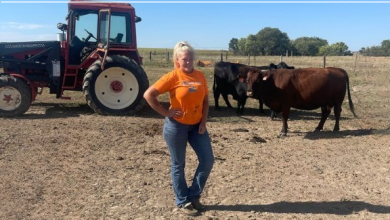MY SON SAID FARMERS WERE “LOW CLASS”—SO I TOOK HIM TO THE RANCH TO SHOW HIM WHAT REAL WORK LOOKS LIKE
I knew something had changed in Jalen after his weekend with his dad. He was suddenly flipping his hair like a YouTuber, rolling his eyes at my boots, and acting like chores were beneath him.
The final straw came at breakfast.
“Why should I help with chores?” he said, barely looking up from his phone. “That’s like… low class. Only farmers do that.”
I set my coffee down slowly, looked him square in the eye, and said, “Well, good thing for you—your mom is a farmer.”
He blinked. “Yeah, but you’re like… a cool one.”
I didn’t argue. I just told him to pack a bag. We were going to the ranch.
This wasn’t a cute fall-themed patch for Instagram selfies. It was the real deal: 5 a.m. feedings, broken fences, heavy hay bales, and no shortcuts. I handed him some gloves and said, “You want a hot meal? Earn it.”
He complained at first. Dragged his feet. Checked his phone like it owed him something. That all changed when Thunder, our oldest horse, stepped on his sneaker—and Jalen screamed like it was the end of the world.
I didn’t laugh—not out loud. I just said, “That’s what happens when you try to film a horse that didn’t ask to be on camera.”
Each day, he got a little more worn down. A little dirtier. A little quieter. But he also started paying attention. Especially to Ms. Salome, our elderly neighbor who’s been ranching since before I was born. She told him stories about hauling water barefoot during droughts, her hands like leather from years of hard labor.
Jalen didn’t have much to say after that.
Then today, something shifted.
I found him crouched by the chicken coop, gently talking to one of the lambs. He didn’t know I was watching. But I saw him wipe at his eyes.
Then he walked over, handed me his phone, and said, “I’m done with this for now.”
I asked softly, “Done with what?”
He looked down. “Just… done. I wanna do something real.”
I swallowed the lump in my throat. “All right. Let’s go lay down fresh straw in the barn. We’ll talk after.”
That day we did it all—goat feedings, fence checks, hay stacking—and for the first time, he didn’t complain. He didn’t even ask for his phone. He asked questions instead. Real ones. About goats standing on things and why hens make so much noise. He was curious. Engaged.
But the real test came that afternoon.
Petunia, one of our pregnant cows, went into early labor—and it wasn’t going smoothly. I called the vet, but he wouldn’t make it for an hour. I looked at Jalen and said, “I need you.”
He paled. “I don’t know how to help.”
“You’ll be my eyes. Just follow my lead.”
We guided Petunia to the birthing pen. Jalen stayed by her head, whispering calmly, stroking her gently, doing his best to keep her steady. He didn’t back away. Not when I had to get hands-on to help with the birth. Not when things got messy.
And when that calf arrived—healthy, blinking, breathing—Jalen just stared. In awe. He reached out and touched its tiny side like it was the most fragile thing on Earth.
“You did good,” I told him, my voice thick.
He smiled, shaken but proud. “That was… intense. But also kinda amazing?”
“Incredibly amazing,” I said. “That’s ranch life. Sometimes you only get one chance to do the right thing.”
By the time the vet arrived, it was all over. Petunia and the calf were safe. Jalen even let out a whoop of excitement—and I hadn’t heard that kind of joy from him in a long time.
That evening, we sat on the porch under a sunset sky, sipping lemonade. It was quiet. Peaceful.
“Mom?” he said after a while. “I’m sorry. About what I said before. About farmers.”
I stayed quiet, letting him say his piece.
“I didn’t get it. I didn’t know how hard you work. How much goes into this life. If farmers stopped working… we’d all be lost.”
“You’re right,” I said. “Farmers feed the world, Jalen.”
He nodded, then added, “I was being a jerk. I didn’t mean it.”
I squeezed his shoulder. “Apology accepted.”
Just then, headlights rolled up the drive. His dad’s truck. Polished shoes stepped out onto our dirt-covered path, nose wrinkling at the smell of livestock.
Jalen stood up and waved him over.
His dad looked him over—dusty, sweaty, and proud. “Did she make you do all that… labor?” he asked, half-joking.
Jalen didn’t flinch. “It wasn’t just labor. It was real work. And we delivered a calf today. Saved her life. That’s worth something.”
His dad looked caught off guard. “That’s great, but—”
“No ‘but.’ This ranch? It matters. I get that now.”
His dad had no reply. Just nodded and backed off, climbing into his truck and disappearing down the gravel road.
I handed Jalen another lemonade. “You okay?”
He took a long breath. “Yeah. He won’t get it. But I do.”
He looked out at the barn. “And I like this life.”
We sat together under the stars for a long time.
Later, before bed, he showed me a video he’d taken—not of anything flashy or funny, but a quiet, shaky clip of Petunia licking her newborn calf, soft nickers in the background. You could hear Jalen’s whisper, filled with awe.
“Maybe I’ll post it,” he said. “Let people see what real work looks like.”
I nodded. “Just make sure you always put the animals first.”
“I will,” he promised.
The next morning, Jalen was up with the sun. Feeding lambs. Checking on the calf. Fixing a latch on the coop. He grumbled a bit—but it was different. He was invested.
And you know what? Watching him cradle that lamb, you wouldn’t believe this was the same boy who once called farmers “low class.”
He’s still Jalen—stubborn, smart, a little sassy—but now he knows the value of sweat on your brow and mud on your boots.
And the biggest lesson?
There’s no such thing as “low class” when you’re putting in honest work to feed families, care for animals, and tend to the land.
Work is work. And dignity lives in the doing.
We’ll still clash sometimes—moms and sons do—but now he sees the ranch, and the people who live it, through new eyes.
Sometimes, the best way to teach isn’t to lecture—it’s to let them live it.
Because the real lessons? They show up in the dirt, the chores, and the miracle of a calf taking its first breath.
So if this story speaks to you—share it. Because the world could use more reminders that every kind of work has worth… and sometimes, you have to get your hands dirty to see the beauty right in front of you. 🌾🐄💛




